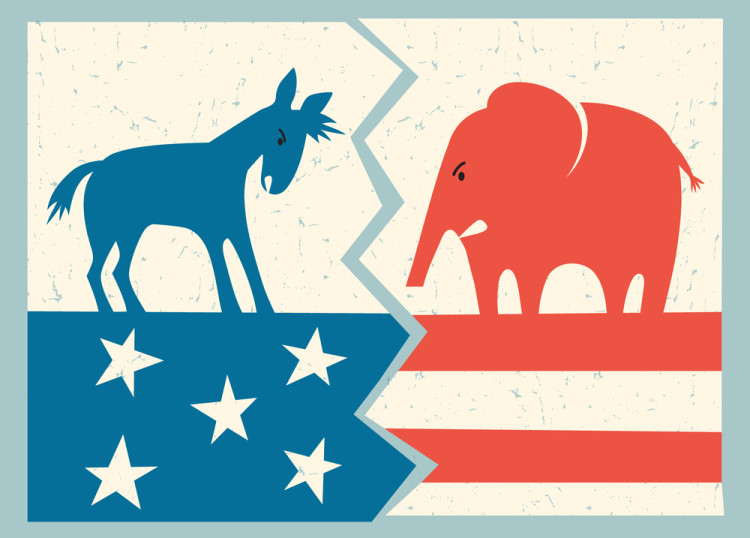Parties, Not Voters, Should Choose Nominees: Jonathan Bernstein

published Apr 19th 2016, 4:56 pm, by Jonathan Bernstein
(Bloomberg View) —
Supporters of Bernie Sanders are complaining about how restrictive the rules are for Tuesday’s New York’s primary. It is a closed election — only registered Democrats can vote for Democratic candidates — and the deadline for registered voters to switch affiliations was way back in October.
Is that an example of voter suppression, as some New Yorkers suing the state would have it?
No, it isn’t. As with caucuses instead of primaries, or the Democrats’ superdelegates, or the Republican system of delegate selection, the same concept applies: Nominations are a party’s internal choice, and it should be entitled to make that choice as it sees fit — as long as it is open to participation by new members.
A party may prefer closed primaries because it wants only those who have chosen to affiliate with the party — not independents or those belonging to other parties — to have a say in its important decisions. Far from being exclusionary, closed primaries may even help recruit new voters to join a party, the idea being that once people take the formal step of partisan registration, they’ll be more likely to cast ballots for all the party’s candidates.
Closed primaries are also a way to curb outside mischief-making, such as Rush Limbaugh’s “Operation Chaos,” which aims to flood the Democratic primaries with non-Democratic voters.
Parties in some states have preferred to have open primaries. They may believe that allowing more potential voters to participate will produce a candidate who is more likely to win the general election. Or that opening up a primary to unregistered voters will encourage them to become party members eventually. Or the parties may simply believe in empowering all voters, period.
Regardless, the parties should decide. It’s their process. It’s how they define and redefine themselves in a big sprawling system.
Does this justify an early deadline for registered voters to switch parties? On the whole, I support lower barriers of entry into parties, and voter registration is part of that. But anyone can lend time, money or expertise to his or her favorite candidate, whether or not that citizen is eligible to vote in the presidential primary. The parties do little to block that activity. And those resources are more important than the vote itself.
General elections are different. It should be easy for everyone to vote in them, and high participation should be a priority.
Ezra Klein of Vox worries that presidential elections face a “legitimacy problem” because the seemingly convoluted process is so different from what voters expect. That’s the consequence of a century of determining nominations for many offices through primaries. But I’m not sure that’s a real problem. As long as the party is able to reach a consensus on nominations that all of its major actors can accept, voters will go along. And if the party can’t reach that consensus — or if a candidate with an independent following refuses to accept its decision — then the party is in trouble no matter how fair the procedures might have been.
The real problem isn’t that people can’t accept certain party procedures, whether closed primaries or the caucus system or superdelegates. It’s that a century after the Progressives preached against political parties, many in the U.S. don’t really accept the parties themselves as legitimate. This is a much greater threat to democracy than any of these procedural issues because, as the political scientist E.E. Schattschneider said decades ago, “Modern democracy is unthinkable save in terms of the parties.” Individual voters just can’t get anything done by themselves. Only with the structure and organization of political parties, even the relatively decentralized ones in the U.S., can voter impulses translate into government action.
Paradoxically, the parties in 2016 have demonstrated once again that they are the real vehicles for change in a big democracy. The Republican Party will be different because of the insurgencies of Donald Trump and Ted Cruz, and the Democrats because of Bernie Sanders, even if none of these candidates is nominated. This is especially true in the case of Cruz and Sanders, because their supporters pushed hard against existing party priorities and preferences, and were also able to make a serious dent in them. It would be a shame if the insurgent candidates used their hard-earned clout to harm their parties, instead of making them better able to accomplish something.
This column does not necessarily reflect the opinion of the editorial board or Bloomberg LP and its owners.
To contact the author of this story: Jonathan Bernstein at jbernstein62@bloomberg.net To contact the editor responsible for this story: Katy Roberts at kroberts29@bloomberg.net
For more columns from Bloomberg View, visit Bloomberg view
copyright
© 2016 Bloomberg L.P







No Comment